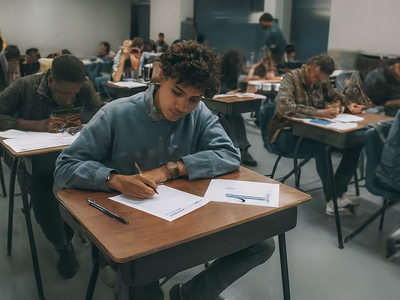BENGALURU: The Karnataka high court (HC) directed Karnataka State Law University to develop guidelines and standard operating procedures (SOP) so as to protect the integrity of examinations and ensure fairness for students.
Justice Suraj Govindaraj, while allowing the petition of first-year LLB student and Anekal resident, HM Rahul, provided specific directives to the university in this regard.
The court mandated examination transparency through technology, including high-resolution CCTV cameras in exam halls to monitor and record activities, with real-time server upload to prevent tampering.
It further said that the invigilators must wear high-resolution cameras to document their movements, with footage uploaded instantly to servers for verification.
The judgment also calls for jammers at exam venues to block unauthorised communication via radio frequency, microwaves, or mobile phones. Flying squad officials must wear high-resolution cameras during inspections, with immediate upload of recordings to prevent manipulation.
In case of allegations of malpractices, the universities should notify the students via email, using their official address collected during admission. Student statements and malpractice committee proceedings require video recordings with real-time server upload, adhering to Section 105 of Bharatiya Nagarik Suraksha Sanhita, the order stipulated.
On April 12, 2024, during ‘legal method’ exam, flying squad confiscated answersheet and hall ticket of Rahul, a student of Kengal Hanumanthaiah Law College in Hubballi.
Rahul claimed that he was compelled to sign documents without review and, that, in May, a malpractice committee issued directives without proper inquiry.
On July 1, 2024, he was debarred from future exams and academic progression.
The university claimed that Rahul admitted to possessing micro-photocopy material, but Justice Govindaraj found the procedures inadequate. The court noted that merely obtaining signatures on typed documents fails to meet the legal requirements.
The case has been returned to the malpractice committee for fresh review. Rahul may participate in the current examinations, with the results to be declared if he is exonerated, the court said.




